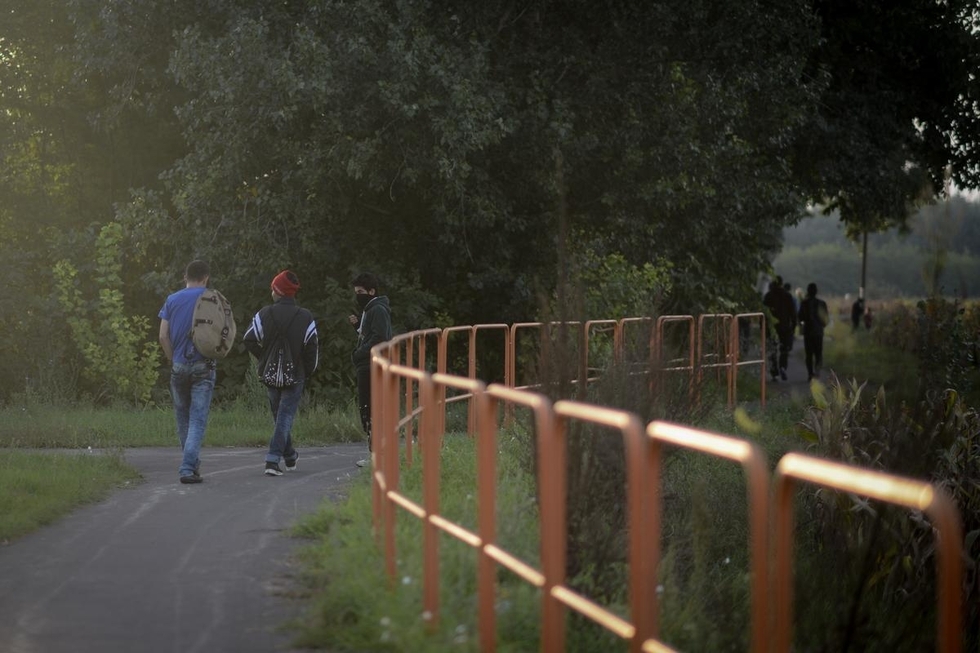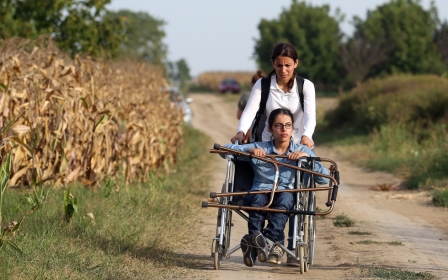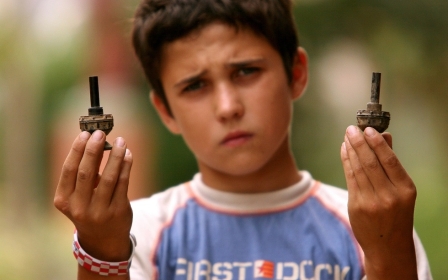People smuggling: Hungary’s new black economy

For all the refugees who managed to get onto Hungarian soil, new dramas and new difficulties await them.
After the closure of the border, the registration centres where refugees are kept are overcrowded and many of them try to escape to reach the border with Austria and head to Germany.
Opposite the registration camp of Roszke on the border with Serbia, there is a petrol station. At night, every night, it transforms into a repository of Hungarians who have become modern traffickers.
They have old cars, vans, trucks and wait for the Syrians, Iraqis and Pakistanis coming out of the woods to group them and take them to the Austrian border at exorbitant prices.
A few nights ago, MEE visited the petrol station. It might have been a usual moment to pause on the route for so many truck drivers.
But the reality of the situation was revealed when a group of Syrians - six, seven, eight - jumped on the sly into the back of a truck.
When MEE approach them asking what was happening, the driver went off and the Syrians, who had a sleeping bag each and a few things packed into a backpack, explained how the "modern European human trafficking" operates.
“They, the drivers, are waiting here,” says Ahkem, a Syrian from Homs. “They ask us for up to 500 euros ($569) for an hour's drive to Austria. Many have told us that when drivers see police on the street, they leave along the way all the people who have loaded, in the middle of nowhere, on the roadsides, without giving them any indication [of where to go].
“We do not understand how all this is possible. We fled from a war and we walked kilometres at night. We arrived here in Europe and merely hoped to meet in front of us a helping hand extended. Instead we meet another crowd of people who want to profit from our fate.
“This guy next to me - his name is Ibrahim - was cheated in Greece, on the border with Turkey.
“A self-styled driver offered him to take him to Athens. Instead he gave up after a few kilometres. He stole all the money Ibrahim had and from that day we - who did not know Ibrahim before - we're taking care of him.
“I was a teacher in Syria, when I look at these people who are waiting for us to speculate on our trip, on the one hand I know that we are almost forced to pay them to reach Austrian border, on the other hand I feel really sorry for them because I know how poor some areas of Hungary are."
This is yet another paradox of this exodus: the emergence of a parallel economy due to desperation and a lack of joint action of European governments.
Probably the lorry containing the bodies of dozens of refugees found on a highway in Austria a few weeks ago had left a petrol station like this, full of people willing to do anything to reach Germany.
The second paradox is that all this coming and going of vehicles loaded with refugees takes place under the eyes of the Hungarian soldiers who patrol the registration centre across the street.
'Drivers of desperation'
When we get back to these “drivers of desperation” to ask what happens in the darkness of this petrol station, everyone thinks that we are policemen and - with the sweaters they wear - they begin to cover the license plates of vehicles and go in dribs and drabs way, shaking their heads without answering any questions.
Along the wire mesh fence, reinforced and kilometres long, Hungarian police try to find refugees hidden among the trees.
At sunset, two days ago, MEE spoke to a group of Iraqis and Syrians who had been been detained by police, a small pickup truck and a man who appeared to be their smuggler still alongside them.
Sharif was from Baghdad and spoke in broken English, helped by his nephew Said, a 17-year-old pastry chef.
"My uncle had a shop of mobile phones and computers. Our family has been destroyed in recent months. My father died in a car bomb, one of many that unfortunately gut life in Baghdad. I wanted to study. But I started to work as an apprentice. Then we could no longer endure this life," said Sharif.
"We took courage in each other and we came away. Turkey, Greece, Macedonia, Serbia and now here. We decided to pay that man to go in his truck, because we do not want be registered here - this country does not respect us and scares us. We just want to reach our relatives in Sweden. And try to start again a new life.”
Next to them was Mohammed, a man of about 40 from Hasaka, the Syrian city threatened by the presence of the Islamic State group.
When asked why he had run away he joined the palms of both hands under his chin, as if to evoke a long beard.
"Daesh, Daesh,” he said, referring to IS using a derogatory Arabic term. “I was scared. I left alone, leaving my wife, our children and my little sister there. I promised them that I would arrive in Europe, that Europe was a civilised place where they would help everyone. I promised them that I would arrive safe and I would save the whole family and now that I run away from the war I am detained here, on the side of the road like a criminal. But how is this possible? We just wanted to get to the Budapest train station or to the Austrian border. We just want to save ourselves, we are not committing any crime.”
Registration centres crammed with people. Lack of linguistic mediators. Borders closed. And, turning a tidy profit, a bevy of smugglers filling cars and trucks for 1,000 or 1,500 euros per trip.
The new economy of this migration has the face of smuggling.
The last thing we see as we leave the petrol station of Roszke is a Hungarian woman and her husband collecting money from Syrians aboard a lorry, each person handing over a wad of banknotes. And then off they go along the dark highway, refugees fleeing from war, hidden from view, and trafficked and exploited in a black market driven by desperation.
New MEE newsletter: Jerusalem Dispatch
Sign up to get the latest insights and analysis on Israel-Palestine, alongside Turkey Unpacked and other MEE newsletters
Middle East Eye delivers independent and unrivalled coverage and analysis of the Middle East, North Africa and beyond. To learn more about republishing this content and the associated fees, please fill out this form. More about MEE can be found here.




